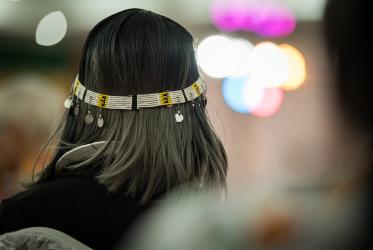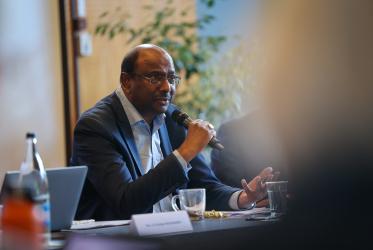Church representatives at a recent Oikotree Global Forum in Johannesburg, South Africa stressed the need to support peoples’ movements promoting justice in the economy and ecology, a concern, they say, that lies at the heart of the faith.
The forum was organized by the World Council of Churches (WCC), World Communion of Reformed Churches (WCRC) and the Council for World Mission (CWM) from 3 to 8 March, and it was attended by more than fifty representatives of churches, ecumenical organizations and people’s movements.
The Oikotree movement was initiated by the WCC, WCRC and CWM as an ecumenical space where people can seek solidarity in faith while living in the midst of threats based on oppression, economic injustice and ecological destruction.
At the forum, the need to support people’s struggles against companies like Pohang Iron and Steel Company (POSCO) in India was emphasized. POSCO, a United States-South Korean company, is conducting a multi billion dollar steel and port project in Odisha, India.
According to media reports, the project will displace at least 22,000 farmers, affecting the livelihoods of 20,000 fisherfolk, generating a water crisis and harming livestock in the area. The project is said to deplete forests where Adivasis or tribal people live.
“Despite lacking an environmental clearance, the Indian government is proceeding with the forceful acquisition of land for the project,” said Tridib Reeves, a social activist from India.
“The local communities opposing the steel mill are being criminalized. Leaders are being thrown into jail, protestors have been attacked by armed people, and at least three protestors were killed in a bomb attack on 2 March,” he added.
With regards to people’s struggles in other parts of the world, the participants called for solidarity and action against the occupation of Palestine. Issues demanding global solidarity included militarism in Colombia, the Philippines, as well as poverty and inequality in Southern Africa.
“The formation of the Oikotree movement is a good way of bringing together ecumenical voices addressing injustice today,” said Dr Rogate Mshana, the WCC programme executive for Poverty, Wealth and Ecology.
“The forum in Johannesburg affirms Oikotree as a ‘movement of movements’. This affirmation is an inspiration for those who are addressing exploitation of the people and earth by global capitalism,” he said.
“Therefore, the cooperation between the WCC, WCRC and CWM to make this movement a reality is immensely commendable,” added Mshana.
The Oikotree Global Forum identified land as an overarching theme for theological reflections, education and awareness-building, networking, research and advocacy for the next two years.
The Oikotree movement will present a “Global Kairos Faith Stance”, a document in progress, at the upcoming 10th Assembly of the WCC in Busan, Republic of Korea.
Read WCRC news release on the Oikotree Global Forum












